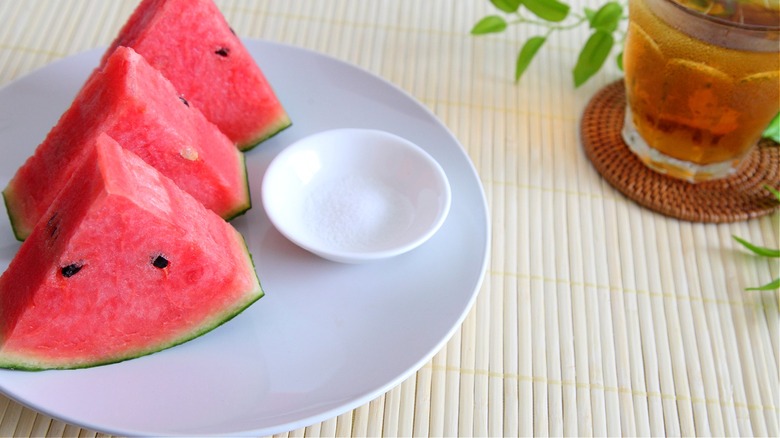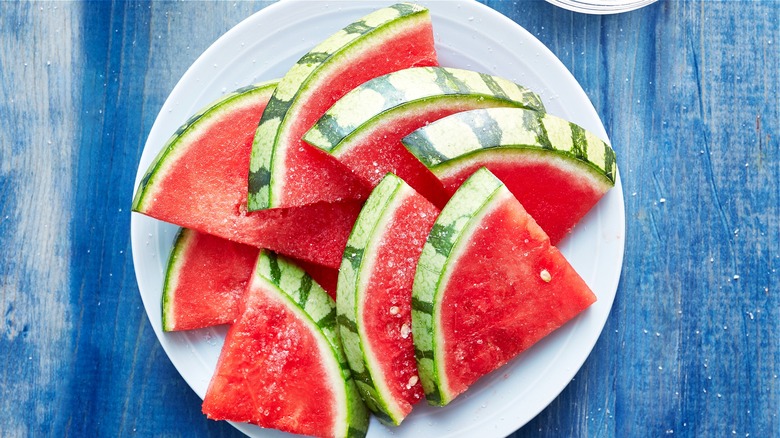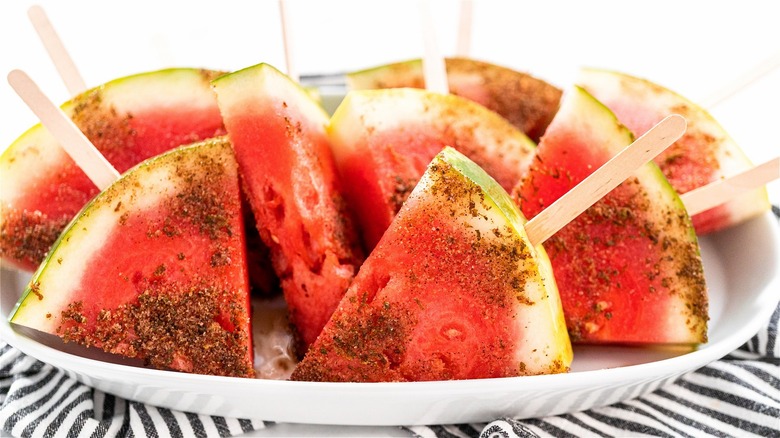The History Of Sprinkling Salt On Watermelon
Watermelon is one of those fruits able to satisfy your sweet tooth and keep you hydrated at the same time. While Cleveland Clinic notes watermelon has vitamins and minerals like calcium, vitamin C, and magnesium, this bright pink fruit is also 92% water. To increase your electrolyte consumption and enjoy a tasty, unconventional snack, you might frequently add a sprinkle of salt to watermelon slices before chowing down. Next to watermelon and cucumber salad, salted watermelon serves as a unique and satisfying way to consume this sweet and juicy fruit. Yet, who started this bizarre trend in the first place?
Believe it or not, many countries have added salt to watermelon for years. Historically, when we look at the countries that have long since enjoyed a version of this salty-sweet snack, many are considered warm-weather environments. Next to America's southern states, Japan is known for its harsh, humid summers. Countries like Mexico, Indonesia, and India tend to lean on the warmer side of the spectrum throughout the year. While watermelon is one of the most hydrating fruits available, more juice is created when a bit of salt is added to the surface. Whether you use table salt, Himalayan, or flaky granules, salt draws out watermelon's inner juices, making this fruit even more refreshing and satisfying for those in warm climates.
What makes salted watermelon an ideal snack?
Watermelon has long been regarded as one of the best things to eat and drink to recover on a hot day. In America, southerners have added salt to this sweet fruit since the beginning of the 20th century, utilizing this hydrating snack to replenish lost electrolytes, especially during hot summer months. Salt contains sodium and chloride, which help our bodies maintain fluid and nutrient levels.
Beyond the U.S., Japan has long enjoyed salted watermelon, as have fruit lovers in the Philippines, India, and Saudi Arabia. Many other countries enjoy this well-balanced snack, and for good reason. Even though we may not be able to pinpoint an exact person or continent responsible for the birth of this refreshing delight, we can look at all the different reasons why salted watermelon satisfies our taste buds.
Next to salted watermelon's hydrating benefits, salt also masks unwanted bitterness in lackluster fruit. Food science professor Linda Bartoshuk once hypothesized that more foodies with more taste buds and heightened taste sensitivity lived in warmer climates. From this point of view, salt may be frequently used to mask watermelons' unwanted bitterness and increase this fruit's sweetness. While watermelon may become increasingly hydrating and sweet with a small sprinkle of salt, many countries have used salt with other tantalizing ingredients to enjoy this juicy fruit in all its sweet and savory glory.
Salt isn't the only ingredient used to enhance watermelon
Among the many fruits you should be seasoning with salt, watermelon is a popular choice since this bright pink fruit is also enjoyed with culturally specific spices and extras. While chili peppers have been a mainstay in Mexican culture for thousands of years, chili powder has been added to watermelon and other fruits as a refreshing snack as well. Interestingly, pico de gallo used to be exclusively defined as a fruit salad with varied ingredients like lime juice, salt, and chili powder before the popular salsa of tomatoes, onions, and cilantro was coined under the same name. Watermelon is now enjoyed with extras like Tajin, lime juice, and Chamoy, a popular Mexican condiment made from dehydrated fruit and spices.
Apart from Mexico, many other countries have wasted no time transforming watermelon into a delightful snack that aligns with their preferred culturally specific tastes. Mexicans may use chili powder, but Indians have been known to add chaat masala or a distinct blend of Indian spices. Each country has developed a specialized way of enjoying this refreshingly sweet fruit, but salt seems to be one unifying way to enhance juicy watermelon across continents. While the specific history of consuming watermelon with salt is hard to define, this sweet and savory snack seems to have been prevalent among warm-weather countries for years.


